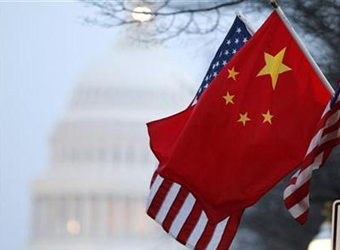Chinese state-run media is all about showing why China has been good for the U.S. ahead of a major meeting between the presidents of both countries.
Stories focus on the positive effects of Chinese companies investing in the U.S., claiming such firms have created American jobs. One photo gallery shows Bank of China employees volunteering at a Thanksgiving dinner in the U.S., and Americans tasting Chinese steamed buns during a food festival organized by Chinese conglomerate Fosun Group in New York.
“Apart from the contributions to the local economy and job opportunities, Chinese enterprises have made continuous efforts in education projects, charity events and community works in the United States in the past years,” reported state media outlet Xinhua.
This is Chinese propaganda out in full force as President Xi Jinping is about to meet American counterpart Donald Trump face-to-face for the first time. Neither side has backed down with tough rhetoric, though officials have toed the line, making it clear there is interest in a continued and healthy relationship.
From the first days of Trump’s time on the campaign trail, he’s railed against China for its trade practices and allegedly stealing away U.S. jobs.
The U.S. trade deficit with China is huge- running at more than $300 billion- but many experts say the trade relationship has been mutually beneficial.
“Trade advantages were based on productivity gains, which benefited U.S. consumers via lower costs,” Mizuho’s Vishnu Varathan wrote in a recent note.
For China, upgrading manufacturing and boosting exports gave way to an explosion of its middle class, pulling many out of poverty. A lucky few even made massive fortunes. China is now the world’s second-largest economy, and has seen incredible wealth creation in a single generation. It now boasts around 600 billionaires.
Some of that Chinese money has been invested in the U.S. — Chinese companies have snapped up iconic properties like the Waldorf Astoria, and others have bought household names, like GE’s appliance unit.
Also on the agenda for the Trump-Xi meeting is how the U.S. and China will respond to the growing nuclear threat in North Korea.
Trump has called North Korea a big problem, while Chinese officials have also called for a stop to missile tests.
But Chinese state media outlets are putting the onus on the U.S.: “The U.S. must bear the major responsibilities for the mess in Northeast Asia, as it has buried too much strategic distrust in the region,” Communist Party mouthpiece The Global Times said in an op-ed.
State media in China can have major influence. Accusations made in reports can have real world impacts, and have even hurt sales for foreign companies in the past. And in a country where media and information remains tightly controlled, it often offers a look into the thinking of the ruling Communist Party.
Source: CNBC



